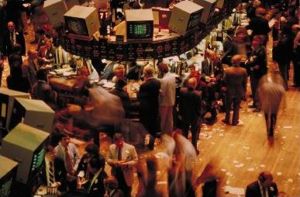Economics
 From Conservapedia - Reading time: 3 min
From Conservapedia - Reading time: 3 min

Economics is the study of opportunity. More specifically, economics is the study of the opportunities made possible by the production, distribution, and consumption of goods and services. 'Because of its primary application to government policy, it is understandable why the subject was originally known as political economy, which was its name from the time of Adam Smith to the last quarter of the nineteenth century, when the change to "economics" took place.' [1] Economics attempts "to explain the way in which individuals interact with one another, to use their limited resources to satisfy their alternative ends." [2] It is a social science, concerned with how people produce, distribute, and consume. Governments can be classified by their economic policy. The U.S. Constitution provides basic protections for private property that are the foundation of American economic policy.
George Reisman, Professor of Economics at Pepperdine University, wrote
| “ | Economics, as the science which studies the production of wealth under a system of division of labor, is actually the science which studies the production of wealth under capitalism.[1] | ” |
C. Lowell Harriss, a professor of economics at Columbia, describes economics as the study of the allocation of scarce goods and services. In market economies, this is determined by supply and demand.[3]
Contents
Why it should be studied[edit]
- Feelings pertaining to the alleged chaos of economic activity rest on ignorance of the knowledge economics provides of the benevolent role of such institutions as the division of labor, private ownership of the means of production, exchange and money, economic competition, and the price system.[1]
- The actual basis of "alienation" resides within the psychological makeup of those who experience the problem. Ignorance of economics reinforces feelings of alienation and allows the alleged deficiencies of the economic system to serve as a convenient rationalization for the existence of the problem [ibid]
- Preppers and survivalists study economics to aid in being prepared for any potential depression, recession or economic crash.
Issues in economics[edit]
Economics deals with a large number of issues:
- Theory of value: What are things worth? How do we compute value?
- Economic justice: How are resources distributed in society? What is the ideal distribution?
- Economic prosperity: Which policies encourage economic growth and development?
- Economic prediction: How can we use economic information from today to predict future results? Which econometrics are leading indicators?
Disciplines within economics[edit]
Economics is a very broad discipline, and involves the following other disciplines as well:
- Moral philosophy: How ought a society produce and distribute goods and services?
- Psychology: What principles underlie human economic decision-making?
- Mathematics: What mathematical models can predict economic outcomes?
- Ecology: How and in what quantities do households consume goods?
Branches of economics[edit]
- Microeconomics: the study of economic decisions of firms and households acting in markets.
- Macroeconomics: the study of aggregate economic decisions and the results of those decisions in a local, national, or world economy.
History of economics[edit]
For a more detailed treatment, see History of economics.
Economic thought originated with the rise of the state. Classical economics, or the long-run model, was articulated by Adam Smith and has since fomented the rise of free-market capitalism in economic thought.[4]
Quotes[edit]
"Economics is haunted by more fallacies than any other study known to man. This is no accident. The inherent difficulties of the subject would be great enough in any case, but they are multiplied a thousandfold by a factor that is insignificant in, say, physics, mathematics or medicine – the special pleading of selfish interests." - Henry Hazlitt, Economics In One Lesson[5]
See also[edit]
- Austrian School of Economics
- Paul Samuelson
- Chicago School of Economics
- Harvard Business School
- Friedrich Hayek
- Average propensity to consume
- Behavioral economics
References[edit]
- ↑ 1.0 1.1 1.2 http://www.capitalism.net/Capitalism/Economics%20and%20Capitalism.htm
- ↑ https://www.pbs.org/wgbh/commandingheights/shared/minitext/int_miltonfriedman.html#10
- ↑ Lessons in Love, by Way of Economics
- ↑ http://cepa.newschool.edu/het
- ↑ http://www.fee.org/library/detail/economics-in-one-lesson-pdf-doc-audio#axzz2KvMNXzEn
 KSF
KSF